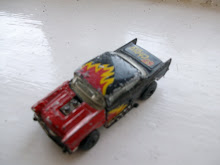Mark Hollis' disappearing act has interested me for some time. As frontman of the pioneering Talk Talk, he went from synth-pop to post-rock before recording a solo album in the mid 90s and staying quiet ever since.
Which isn't too surprising, given his attitude to the pop game. A quick glance on youtube will reveal many awkward interviews from the mid 80s, when Talk Talk were at the height of their popularity.
Despite the elaborate music he would later make, Hollis was kick-started by punk. His elder brother Ed managed Essex outfit Eddie and the Hot Rods and helped out when young Mark formed his own band. Though it came to nothing, a song entitled Talk Talk that the brothers wrote would later name his next band, and provide a hit.
By the mid 80s, with synth-pop all the rage, Hollis needed musicians to record some demos to get a publishing deal: bassist Paul Webb, drummer Lee Harris and keyboard player Simon Bremner were recruited. A record deal was secured and the quintet recorded The Party's Over - a minor hit dismissed by many critics for jumping on the bandwagon. Notably, it featured artwork by James Marsh, who would design all the band's striking album covers.
Though featuring some fine pop songs (Talk Talk, Today and Mirror Man), it did suffer from very dated production. Subsequently, after the single My Foolish Friend, Bremner was replaced by Tim Friese-Greene. Though never appearing on promotional photos, and very rarely on stage, he would prove to be the crucial collaborator and producer needed to help Hollis reach his musical goals.
It's My Life, released in 1984, was a vast improvement on the debut. Though still synth heavy, the songs were a massive step forward. The title song and Such a Shame (apparently inspired by the book The Dice Man) remain classics of their style and time. While the album sunk without trace in the UK, it proved a big hit throughout Europe and It's My Life made the US top 40, where the band toured as support to New Wave heroes the Psychedelic Furs.
The Colour of Spring was an even bigger hit than It's My Life. Lead single Life's What You Make It, built entirely around a four note piano riff, hit the UK top 20, helped by a wonderful Tim Pope video. With extra money to spare due to the worldwide success of It's My Life, the band abandoned synths, bringing in the likes of Steve Winwood to provide Hammond organ and Danny Thompson on acoustic bass.
On the back of this profitable success, their label (EMI) were keen for more and granted an open budget for a follow-up. Locked away in the studio for the best part of a year, legend has it that the A&R man burst into tears when he first heard Spirit of Eden. 40 minutes long, it contained only six songs, none of which were even slightly suitable for daytime radio or MTV.
What is important, and time has proven so, is that Spirit of Eden is a timeless work of art. Subdued, crafted and beautifully played, I can't believe it sounds like anything else that made the album charts in 1988. The anti-heroin I Believe In You was somewhat pointlessly released as a single but any commercial ground gained by The Colour of Spring was lost by Hollis' insistence that the album would be impossible to replicate live (parts of it were improvised) and so therefore there would be no live shows.
Somewhat miffed, EMI released a compilation Natural History to claw some dollar back, which proved to be a decent plan when it sold a million. A further compilation of remixes was a step too far, and court action from the band ensured it was soon withdrawn.
Signed to the Verve label and now minus bassist Paul Webb, 1991 brought Laughing Stock, was continued in the vein of it's predecessor, though it seems even more stripped down and far away. Along with Spirit of Eden, it's one of my favourite albums to listen to at 3am with a bottle of Scotch. It's not chill out music by any stretch, but requires the kind of open listening you can sustain in the late hours.
And that was it, for Talk Talk. Drummer Paul Harris would work with Paul Webb as O.Rang and drum on Bark Psychosis' second album Codename: Dustsucker. Webb would collaborate as Rustin Man on an album with Portishead singer Beth Gibbons and Friese-Greene would continue to work as a producer with Lush and Catherine Wheel (huge Talk Talk fans) amongst others.
Hollis himself briefly reappeared in 1998 with a self-titled solo album that continued his musical trends from Talk Talk. Since then, he appears to have retired from music, mentioned as an example of someone for whom artistic purpose was far more important than the whims of record company or public. The move from easily-dismissed angsty pop group for experimental critical darlings is one Radiohead may have paid some attention to.
Sunday, 10 October 2010
Subscribe to:
Post Comments (Atom)

No comments:
Post a Comment